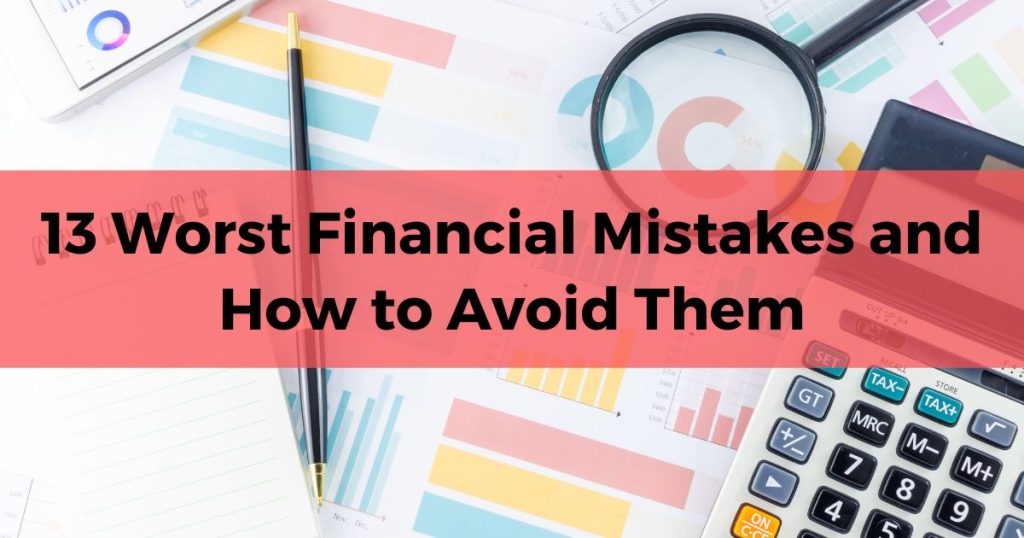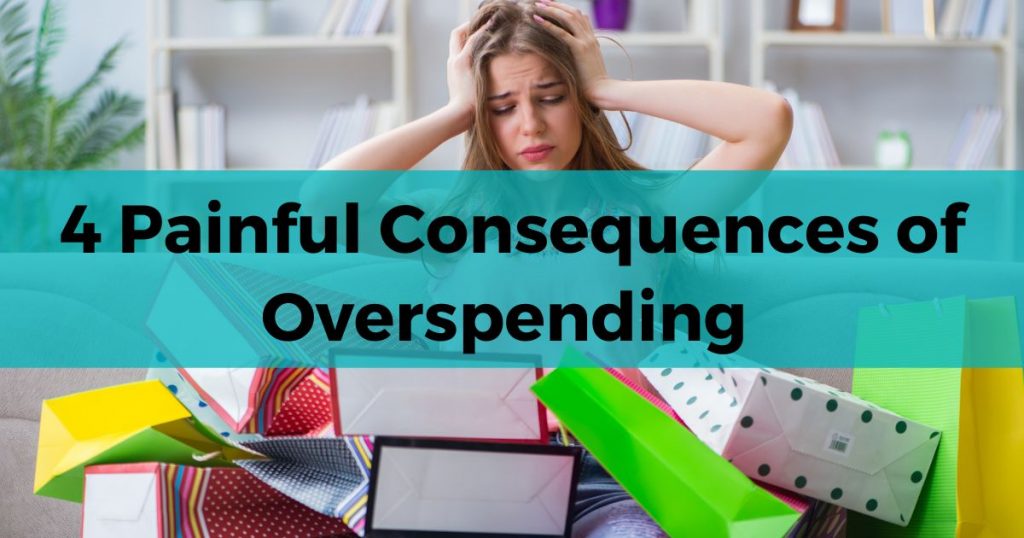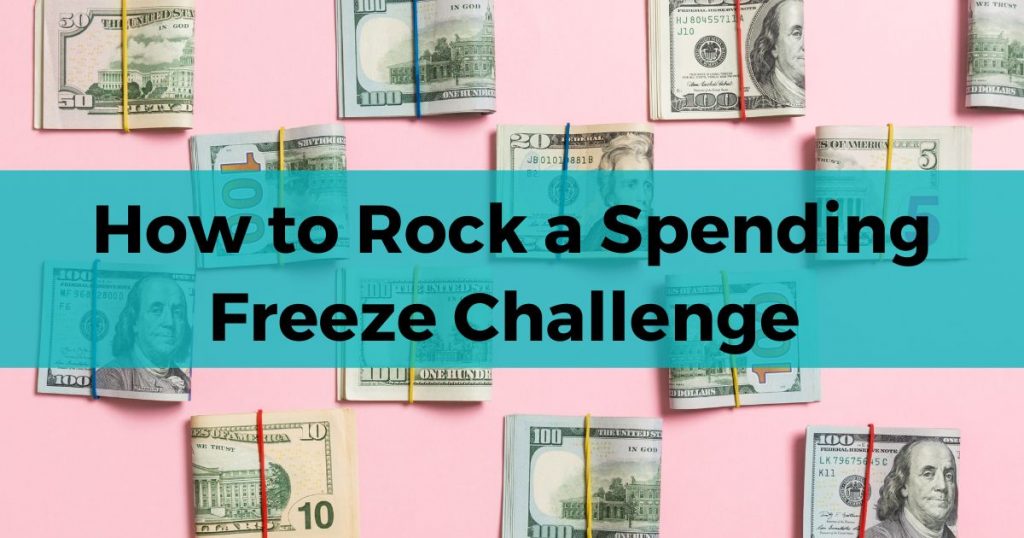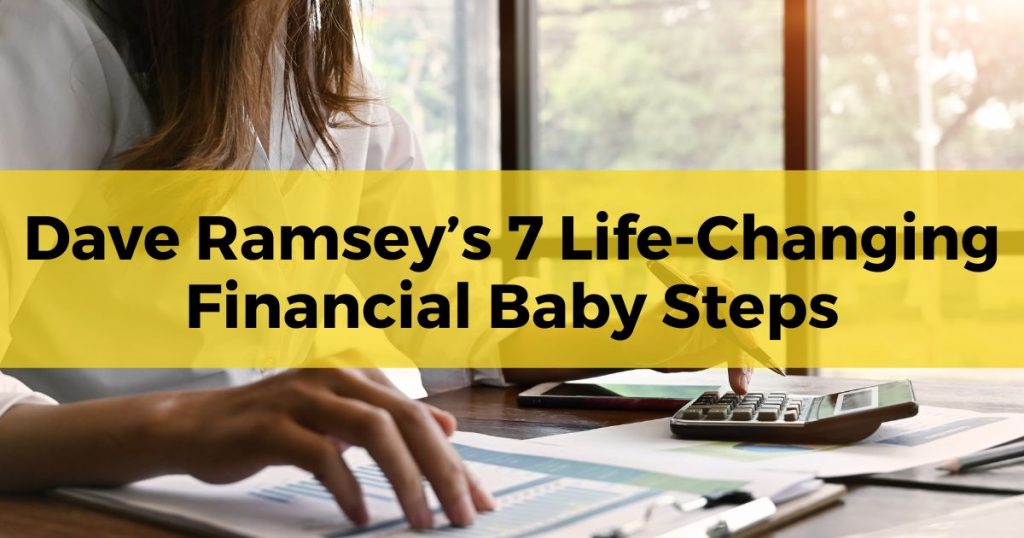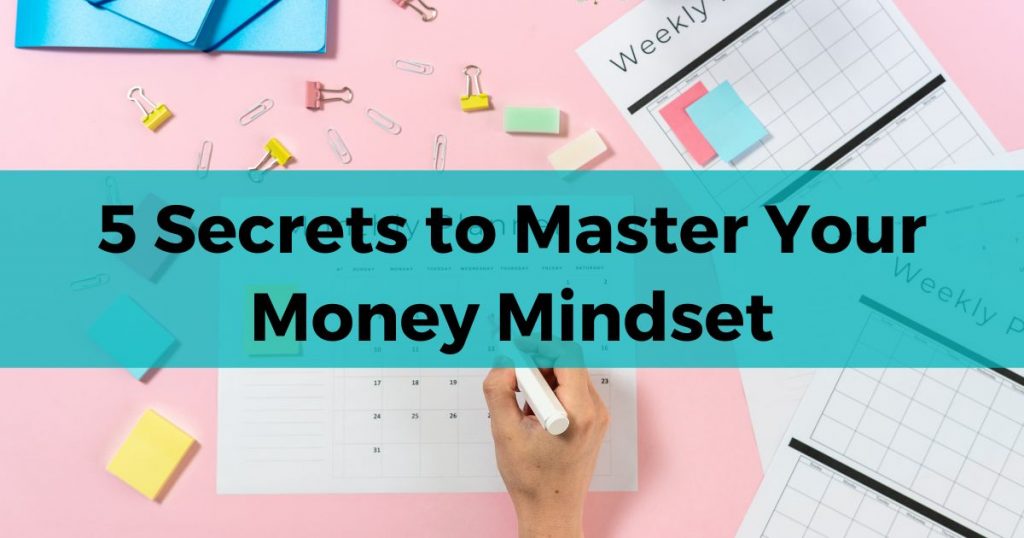Bad financial decisions…we all make them. But if you’re not careful, they can impact the future of your finances in a very bad way.
Trust me, we’ve made almost all the mistakes you can make with money. All these financial mistakes turned into an overwhelming amount of consumer debt. We were living paycheck to paycheck with a ton of financial stress that was taking a toll on our marriage and mental health.
Let’s be real. Nobody intentionally decides to go into debt…it just happens one small mistake at a time. Next thing you know, you have a mountain of debt that seems impossible to deal with.
The sad thing is so many people are living in similar situations because they don’t know how to manage their money. The worst part is it all could have been avoided.
So today, I want to talk about the worst financial mistakes people make with their money that can lead to financial stress, living paycheck to paycheck, and/or crippling debt.
Disclaimer: This post may contain affiliate links. This means I receive a small commission, at no extra cost, if you purchase using the links below. Please see my earnings disclaimer for more details.
Table of Contents
Worst financial mistakes
Money management is essential to becoming financially stable. Here the most common money mistakes that can wreak havoc on your financial well-being.
Not budgeting your money
Not having a budget is the most common mistake that people make.
There is this misconception that you only need a budget if you’re broke and struggling to get by. The reality is that everybody needs to budget!
Budgeting is making a plan for your money, so you can reach your financial goals.
If you’re not budgeting, there is a good chance you’re making frivolous purchases and overspending unnecessarily. You may even be living paycheck to paycheck because of your non-budgeting lifestyle.
How to avoid
Create a simple budget for the month. You don’t need to overthink this. It’s simply income minus expenses.
- Add all your monthly income.
- List out and total your monthly expenses.
- Subtract your expenses from your income.
- Then, figure out what to do with any extra money or make budget cuts and determine how to pay for all your essential budget items.
By creating a monthly budget, you become more aware of your spending, which helps you to manage your money better. You may even find that you have way more money than you thought because you have a spending plan.
Related:
How To Create A Zero-Based Budget To Simplify Your Finances
How to Avoid Budget Burnout: 11 Tips for Staying Motivated
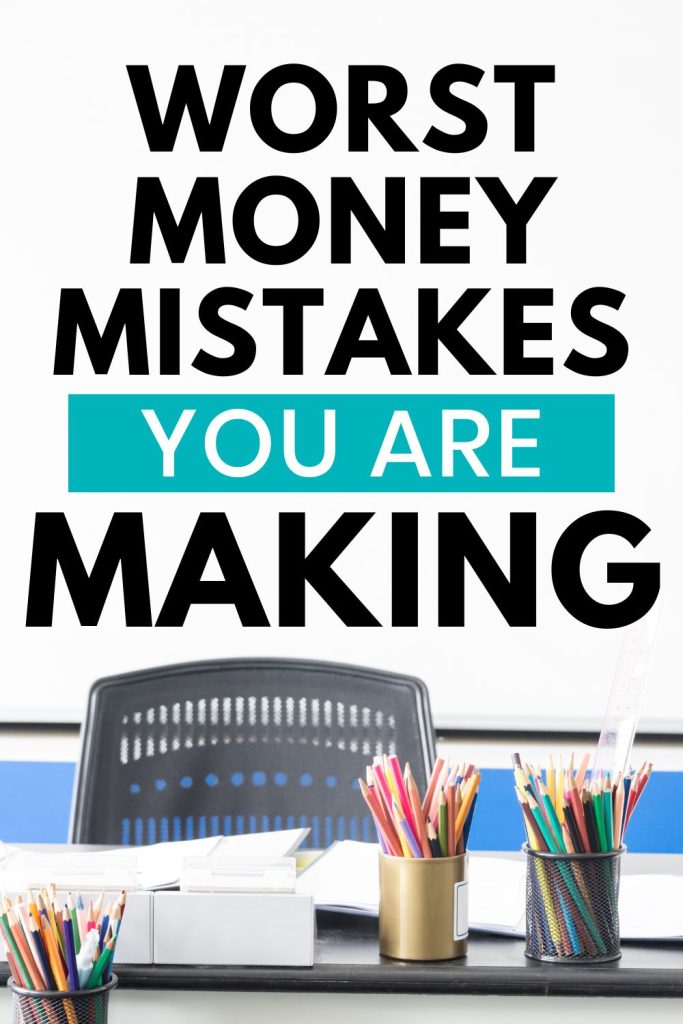
Not tracking your spending
Budgeting and tracking your spending go hand in hand. You can’t know if you’re sticking to your budget if you’re not tracking your spending.
This can lead to overspending despite having a budget. It can also mean you’re taking on debt because you don’t have enough money to cover your monthly expenses.
How to avoid
There are several ways to track your spending.
- Use an app like Mint or Everydollar to track your daily spending.
- Use a budget planner, journal, or plain paper to track your spending.
- Use cash envelopes to help track how much money you’re spending.
The point is you want to track your spending as soon as you spend it. This way, you know how much is left in your budget categories.
Related:
12 Important Reasons And Benefits Of Tracking Your Expenses
How To Use EveryDollar App To Better Manage Your Money
How To Start Cash Stuffing For Beginners In 2023
Spending money you don’t have
Buying things with credit ensures you are making monthly payments for the foreseeable future. Constantly making payments like this steals from your future income. It can also lead to debt you can’t handle.
The even bigger problem is we don’t need most of the stuff we are borrowing for. We just don’t want to wait and save for it.
This unwillingness to save for what we want and the constant need to “keep up with the Joneses” leads to discontentment and financial stress.
It’s crazy how we get so wrapped up in consumer culture and always wanting the next new thing that we are willing to take on so much debt.
“We buy things we don’t need, with money we don’t have, to impress people we don’t like.”
Dave Ramsey
How to avoid
The short answer…stop using credit cards and buy now, pay later plans!
Here is how to stop living on credit.
- Have a fund set up for emergencies.
- Save for what you want. A sinking fund for things you need or want will help you pay cash.
- Live a more minimalist lifestyle with less wants. Living with fewer wants will help you save money and stop using credit cards.
Related:
Minimalism For Beginners: How To Simplify And Enjoy Your Life
How to Minimize Your Life and Maximize Your Happiness
Ignoring your finances
Many of us grew up in an era where it was considered taboo to talk about finances, or we had parents who struggled with money management. Therefore, we didn’t learn how to manage our finances correctly.
But that is not an excuse to ignore your finances and hope it works out. Student loans, credit card debt, out-of-control spending, and bad financial habits will follow you forever if you don’t face them.
Related:
5 Secrets To Master Your Money Mindset
4 Painful Consequences Of Overspending And How To Stop
How to avoid
Learn how to manage your money. Take financial literacy course to learn proper money management techniques. I absolutely recommend Dave Ramsey’s Financial Peace University. It’s simple, and it works!
Furthermore, you need to take a good hard look at your financial situation. If you have debt, you need to get out all those statements and total the amount you owe. Then, you need to come up with a debt repayment plan.
Related:
Dave Ramsey’s 7 Life-Changing Financial Baby Steps
How to Slay Your Debt Using the Debt Snowball
Not having an emergency fund
An emergency fund can help you stay out of debt when unexpected expenses arise. When you don’t have money set aside for life’s unexpected events, you’re forced to depend on credit cards to bail you out.
When you use a credit card for emergencies, you are stealing from your future and paying interest on it.
How to avoid
Ideally, you should have 3-6 months of emergency savings to cover anything unexpected. This will keep you from taking out enormous debt that is impossible to pay back.
If you’re in the midst of paying off debt, you should have a $1000 starter emergency fund to cover small emergencies that come up.
Not Paying off Debt
Not paying off debt leads to more debt. When you carry a balance on a credit card, all it takes is one pricey mishap to turn into a devastating situation.
If you don’t have the money to pay cash for it, then you don’t need it. Don’t continue to pile debt onto debt because it can quickly spiral out of control.
How to avoid
Start paying down your debt as quickly as possible using the snowball method. Pay off the smallest debt first and then move on down the list of debts, from smallest to largest. Find ways to make extra cash to help pay off debt quicker and make budget cuts to free up more money in your budget.
Make sure to make your payments on time to avoid late fees and interest rate hikes.
Not being on the same page with your spouse
Handling your finances separately or letting one spouse manage all the finances is not good for your relationship or your personal finances.
When you’re not on the same page with your money management, each person does their own thing and does not communicate with the other. This can lead to overspending, missed payments, and credit card debt (sometimes without the other’s knowledge).
How to avoid
You have to discuss your finances. You should approach your money management as a team. Any income either person makes should go into one account.
As a married couple, you should…
- Create a monthly budget together.
- Discuss financial goals together.
- Pay off debt together.
- Save money and invest together.
Not having financial goals
Having short and long-term financial goals are essential for becoming financially secure. Without financial goals and something to work towards, you’ll most likely overspend and end up in debt.
How to avoid
It’s a good idea to sit down and plan out some short and long-term goals for the future. Make sure if you’re married, you do this together with your spouse.
Plan some short-term goals for your money.
- creating a monthly budget
- paying off credit cards and other debt
- emergency fund savings
- vacation or new furniture sinking fund
Then, plan some mid to long-term money goals.
- retirement savings
- college or education savings
- down payment for a home
- save for a new car
- pay off mortgage
Short and long-term goals keep you motivated and working toward your financial future.
Not saving for retirement
Saving for retirement may not seem very important now when you’re young, but it will be. Not contributing to a retirement fund early on means…
- You miss out on the power of compounding interest.
- You have to work harder and longer to make up for it in later years.
How to avoid
Start retirement planning and investing early on so you can take advantage of compound interest. Most financial advisors recommend 10-15% of your pretax income. If you’re debt-free and can afford to invest more…do it!
Take advantage of a 401k company match or free stock options. This is free money you don’t want to leave on the table!
Not planning for large purchases
Big expenses are usually something you know about in advance (unexpected things are what your emergency fund is for).
Not saving for these big purchases like Christmas, vacations, or new furniture can cause you to borrow money.
How to avoid
Do not put things like Christmas on a credit card! Saving a designated amount each paycheck in a savings account will allow you to pay for these big expenses with cash, not credit.
Related:
Everything You Need To Know About Sinking Funds For Beginners
23 Sinking Fund Categories to Help You Budget Better
How To Budget For Christmas: 15 Debt-Free Tips
Quitting your job without a plan
Quitting your job abruptly without a backup can really hurt your finances, not to mention your relationship. It adds a financial stressor to your life and puts a weight on your partner to carry, which can add resentment and strain to your marriage.
How to avoid
It’s ok to change jobs or even careers, but you have to have a plan to do so. Apply for better job opportunities you’re interested in and go on interviews.
Once you have a new job offer, you can put your notice in. This way, your income continues with a minimal break, and there is no financial stress that comes with it.
Buying a house you can’t afford
The term house poor is when someone has an excessive amount of their income going to a mortgage payment.
According to an article by NBC News, an overwhelming 38 million Americans are house poor.
Some people end up house poor when there’s a sudden decrease in their income, such as a job loss. Other times, it’s because they buy a home they can’t afford.
How to avoid
Before jumping into a mortgage, understand that the more you put down, the less you will owe monthly. So, save the recommended 20% or more to put down on your home.
Furthermore, most financial experts would caution you not to spend more than 28-30% of your income on housing. I tend to side with Dave Ramsey, who conservatively recommends not spending more than 25% of your take-home pay. This way, you can comfortably handle your mortgage payment and still live your life!
Buying new cars
When purchasing a car, most people think buying new is the only way to get a safe and reliable vehicle. Not to mention, the financing incentives are usually better.
But did you know that a new car loses value the minute you drive it off the lot? According to carfax.com, that new car will lose about 50% of its value in the first 4 years.
“The value of a new vehicle can drop more than 20 percent after the first 12 months of ownership. Then, for the next four years, you can expect your car to lose roughly 10 percent of its value annually.”
Carfax.com
How to avoid
With a bit of research, you could find a used car that meets your family’s needs without the hefty price tag that is just as safe and reliable. Buying used will also save you money on car insurance costs and depreciation.
An all-cash offer is the best way to get a good deal on a car. You’ll avoid interest and monthly payments!
Conclusion
Poor financial decisions can have a huge impact on the future of your finances. Whether it’s a few small mistakes that add up or just one big financial blunder, these poor choices can lead to a life of debt and financial instability.
But if you learn to manage your money and avoid these common financial mistakes, you can live without financial stress and a life you love!

